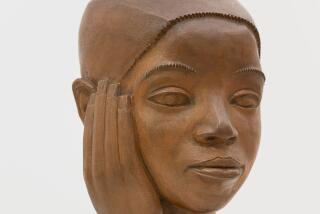Members of the Family
- Share via
It was different back then, before same-gender parents, in vitro fertilization and surrogate motherhood. You had Mom. You had Dad. And you had the kids. Simple.
Etta Mary Johnson will tell you that straight off. There was no fancy scientific method to having babies. You got pregnant the old-fashioned way by someone you’d married and you raised your children and that was that.
Never mind test tube babies. They didn’t even have electricity, gas or phones where she was living, much less innovative ways of having kids. And Pampers were a lifetime away.
She says it with a mixture of pride and defiance, a tiny, 90-year-old lady sitting up straight in her chair, as tart and snappy as an early winter, looking me straight in the eye, unwavering.
“There wasn’t even Scotch tape in those days,” she says. “Or plastic bags. Paper and string were what you had and squares of flannel for diapers.”
Etta Johnson was a traditional mom. She made new clothes out of old clothes for her five kids; they huddled by a fireplace for heat on chilly nights in Utah and took turns reading poetry.
Family was important back then. You stuck together no matter what, during good times and bad, and there was a lot of the bad. But never mind that.
“Families,” she says, “are forever. I believe that.”
*
Born Etta Mary Allen in a small town in Utah when the century was less than a decade old, Johnson was raised on a dry farm that depended on nature to water the crops. When that didn’t work, they went on to different kinds of farming, still living off what God provided.
“They kept me busy,” she says, looking stylish in a sweater, slacks and loafers. She lives with her daughter, Barbara Cope, in Lakewood. “I pulled weeds, herded cattle, milked cows and drove a hay wagon. When you’re busy, you don’t have time to get into trouble.”
She married Gideon Marquardt, a janitor, in 1932 and bore him three daughters and two sons. Barbara was their first. It was during the Great Depression and money was scarce, so Gideon hitchhiked to San Francisco from Salt Lake City, looking for a better life for them all.
“While he was gone, we lived in a small flat, ate a lot of spaghetti and catsup and kept warm in the winter with a coal oil stove,” Johnson says. “We got by.”
When her husband landed a job as a busboy, he sent for them, later working his way up to the position of supervisor in a Bay Area restaurant chain.
The family prospered, but still, Johnson continued to sew their clothes. “Waste not, want not,” she says in a tone not meant to tempt debate. Just 4-feet-9 and 90 pounds, she nevertheless commands respect. “Use ‘em up and wear ‘em out,” she says. “That was our motto.”
She thinks about that and adds, “You know, you lose a lot by not making your own clothes. They don’t mean as much when you buy them.”
*
Marquardt died in 1964. Six years later, Etta married Daniel Johnson, who at 95 is partially disabled. The family has expanded. Now there are seven grown children plus 52 grandchildren and 86 great-grandchildren.
Forced to use a walker sometimes, Etta Johnson still hasn’t lost the peppery spirit that got her through all those hard times. She instilled in her children, who instilled in theirs, the ultimate importance of family. In 1992 she began writing bits of her own history so that her legacy would continue after she was gone.
Later, other family members contributed to the stories and had them bound into a book called “Gems From Grandma’s Jewel Box.” Stories and poems about pets and holidays make up a book filled with memories.
The family gathers every two years for a reunion. Last year it was three days in Los Angeles. Next time it will be in Myrtle Creek, Ore. While food and fun are important, they also reestablish their ties to each other by performing skits and songs based on family history.
I can’t remember ever meeting a closer family, and I want you to think about them this Mother’s Day. The instincts that forged that solid unit are essential to stabilizing a society in peril. A collapse of tradition has cost us dearly.
“People don’t even eat together now,” Johnson says, shaking her head slowly. “They don’t read poetry to each other anymore. That’s sad.”
Al Martinez’s column appears Sundays and Wednesdays. He can be reached online at: al.martinez@latimes.com.






